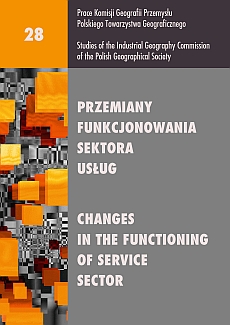Wpływ kryzysu gospodarczego na rynek usług otoczenia biznesu na przykładzie województwa wielkopolskiego
DOI:
https://doi.org/10.24917/20801653.28.5Słowa kluczowe:
kryzys gospodarczy, otoczenie biznesu, usługi dla biznesu, województwo wielkopolskieAbstrakt
Celem artykułu jest analiza funkcjonowania rynku usług otoczenia biznesu w województwie wielkopolskim w warunkach spowolnienia gospodarczego obserwowanego w Polsce po 2008 roku. Analiza ta uwzględnia zarówno podaż usług otoczenia biznesu, jak i popyt generowany przez przedsiębiorstwa korzystające z tych usług. Artykuł powstał w oparciu o badania terenowe przeprowadzone w województwie wielkopolskim. Ze względu na fakt, że instytucje i firmy otoczenia biznesu znajdują się przede wszystkim w dużych miastach, a te na podstawie analizy poziomu rozwoju społeczno- -gospodarczego zostały zaliczone do obszarów wzrostu, badania ankietowe prowadzone były wyłącznie na zidentyfikowanych wcześniej obszarach wzrostu: w Poznaniu i powiecie poznańskim, Koninie, Kaliszu oraz Lesznie. Analiza strony popytowej otoczenia biznesu (przedsiębiorstw) uwzględnia także wyróżnione obszary stagnacji: powiaty słupecki, kaliski, pleszewski. Badanie ankietowe dotyczyło funkcjonowania instytucji i firm otoczenia biznesu, a także zapotrzebowania na usługi otoczenia biznesu ze strony przedsiębiorstw. W szczególności badanie zmierzało do: (1) analizy zmian zasięgu oddziaływania instytucji otoczenia biznesu oraz zmian zakresu świadczonych przez nie usług i ich sytuacji finansowej w dobie kryzysu, (2) identyfikacji zmian natężenia i zakresu relacji występujących między przedsiębiorstwami a instytucjami otoczenia biznesu w czasie kryzysu. Artykuł prezentuje wyniki projektu badawczego: „Rozwój społeczno-gospodarczy a kształtowanie się obszarów wzrostu i stagnacji gospodarczej”, finansowanego przez Narodowe Centrum Nauki (N N306 791940), realizowanego w Zakładzie Analizy Regionalnej Uniwersytetu im. A. Mickiewicza w Poznaniu.Downloads
Metrics
Bibliografia
Aydalot, P., Keeble, D. (1988). High technology industry and innovative environments: The European expierence. London: Routledge.
Bereza, J. (2013). Wpływ kryzysu finansowego na polski rynek pracy. W: Współczesne zagadnienia i problemy ekonomiczne i społeczne. Kraków, 83–114.
Chmielewski, R., Stryjakiewicz, T., Twardowska, J., Waloszczyk, J. (2001). Innowacyjność przemysłu i jej zróżnicowanie w nowym układzie wojewódzkim. W: T. Czyż (red.). Zróżnicowanie społeczno- gospodarcze w nowym układzie terytorialnym. Biuletyn KPZK. Warszawa: PAN 197, 59–102.
Chojnicki, Z. (1999). Uwarunkowania rozwoju regionu nadgranicznego. Koncepcje i założenia teoretyczne. W: Z. Chojnicki. Podstawy metodologiczne i teoretyczne geografii. Poznań: Bogucki Wydawnictwo Naukowe, 355–380.
Daszkowska, M. (1998). Usługi. Produkcja, rynek, marketing. Warszawa: Wydawnictwo Naukowe PWN.
Doloreux, D. (2002). What we should know about regional systems of innovation. Technology in society, 24 (3), 243–263.
Dołzbasz, S. (2009). Instytucje otoczenia biznesu oraz jednostki sfery B+R na obszarze województwa dolnośląskiego. W: Endo- i egzogeniczne determinanty obszarów wzrostu i stagnacji w województwie dolnośląskim w kontekście Dolnośląskiej Strategii Innowacji DAWG. Wrocław: Urząd Marszałkowski Województwa Dolnośląskiego, 64–85.
Dominiak, J. (2006). Struktura i organizacja otoczenia biznesu w aglomeracji poznańskiej. Poznań: Bogucki Wydawnictwo Naukowe.
Gorzelak, G. (red.) (2009). Geografia polskiego kryzysu. Kryzys peryferii czy peryferia kryzysu. Warszawa: Regional Studies Association. Sekcja Polska.
Illeris, S. (1989). Services and regions in Europe. Aldershot: Avebury.
Illeris, S. (1994). Proximity between service producers and service users. Tijdrschrift voor Economische en Sociale Geografie, 85 (4), 294–302.
Illeris, S. (1997). The changing location of service activities in the Copenhagen region. Geografisktidsskrift, 97, 120–131.
Lehner, P., Todtling, F., Trippl, M. (2006). Innovation in knowledge intensive industries. The nature and geography of knowledge links. European Planning Studies, 14 (8), 1035–1058.
Markiewicz, J. (2007). Wpływ instytucji wsparcia na rozwój kooperacji i innowacyjność przedsiębiorstw w województwie zachodniopomorskim. W: Innowacje, przedsiębiorczość i gospodarka oparta na wiedzy. Zeszyty Naukowe, 453. Ekonomiczne problemy usług, 8. Uniwersytet Szczeciński, 133–145.
Matusiak, K.B. (2007). Systemy wsparcia przedsiębiorczości i procesów innowacyjnych. W: Innowacje, przedsiębiorczość i gospodarka oparta na wiedzy. Zeszyty Naukowe, 453. Ekonomiczne problemy usług, 8. Uniwersytet Szczeciński, 145–155.
Mizgajska, H., Wściubiak, Ł. (2009). Współpraca małych i średnich przedsiębiorstw o zróżnicowanym zaawansowaniu technologicznym z nauką. W: M. Bąk, P. Kulawczuk (red.). Warunki skutecznej współpracy pomiędzy nauką a przedsiębiorstwami. Warszawa: Instytut Badań nad Demokracją i Przedsiębiorstwem Prywatnym, 141–154.
Nowosielska, E. (2000). Sektor usług w aglomeracji warszawskiej 1992–1997: przemiany strukturalne i tendencje rozwoju. Dokumentacja Geograficzna, 17. Warszawa: IGiPZ PAN.
Orłowski, W., Pasternak, R., Flaht, K., Szubert, D. (2010). Procesy inwestycyjne i strategie przedsiębiorstw w czasach kryzysu. Warszawa.
Todtling, F., Lehner, P., Kaufmann, A. (2008). Do different types of innovation rely on specific kinds of knowledge interactions. Institute of Regional Development and Environmnet. Wien. Pozyskano z www.epub.wu.ac.at
Wach, K. (2008). Regionalne otoczenie małych i średnich przedsiębiorstw. Kraków: Wydawnictwo Uniwersytetu Ekonomicznego w Krakowie.
Zioło, Z. (2013). Uwarunkowania rozwoju przedsiębiorczości w warunkach kryzysu gospodarczego. Przedsiębiorczość–Edukacja, 9, 10–33.
Pobrania
Opublikowane
Jak cytować
Numer
Dział
Licencja
Artykuły publikowane są zgodnie z warunkami licencji Creative Commons (CC BY-ND 4.0; uznanie autorstwa-bez utworów zależnych).

